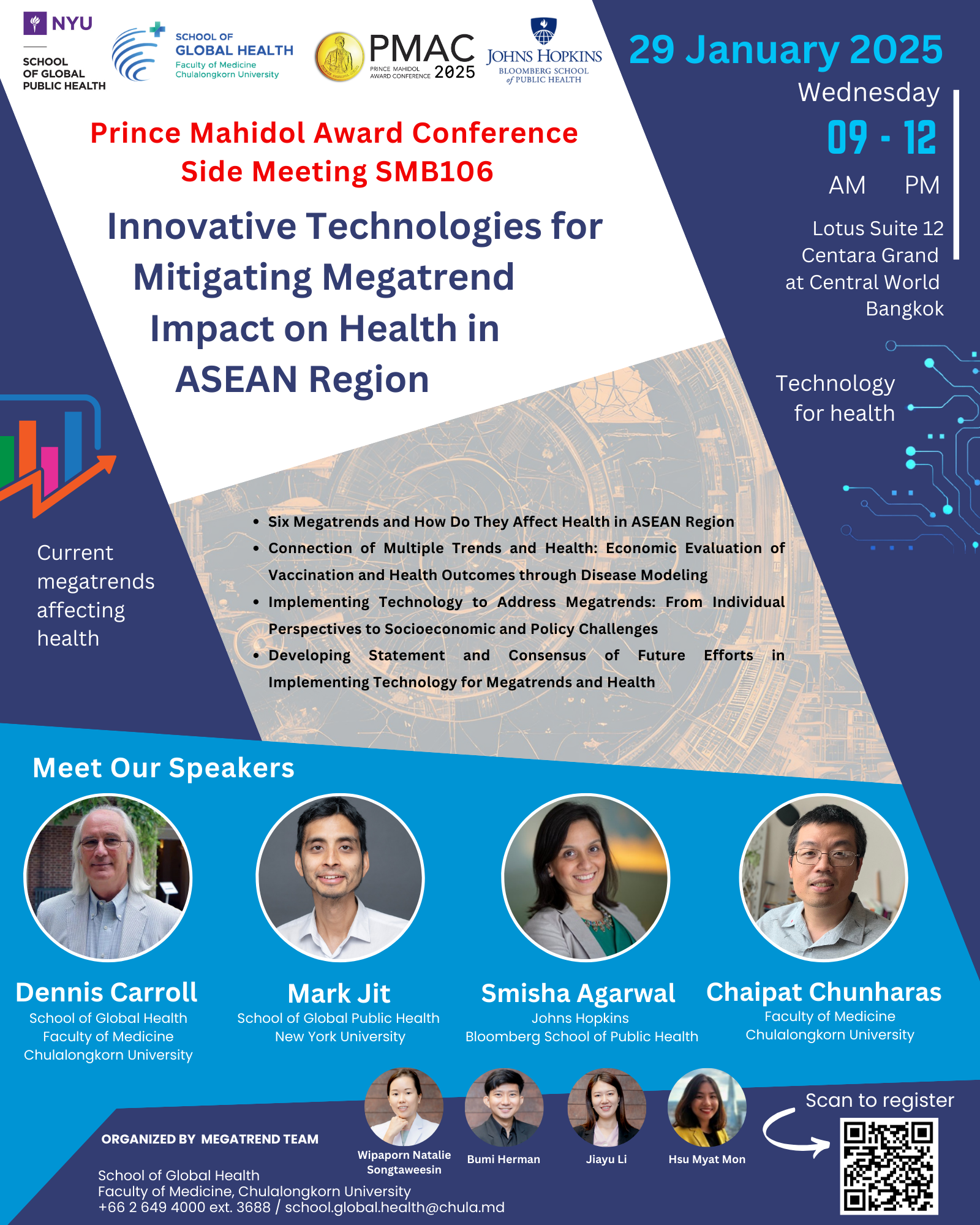Side Meetings
SMB106
Innovative Technologies for Mitigating Megatrend Impacts on Global Health in ASEAN region
29
Jan
- School of Global Health, Faculty of Medicine Chulalongkorn University

Global megatrends such as climate change, geopolitical shifts, demographic changes, and socioeconomic disparities are increasingly influencing health outcomes worldwide. Climate change, with its rising temperatures and extreme weather events, exacerbates health issues by increasing the prevalence of diseases, disrupting health services, and affecting food security. Geopolitical instability, including conflicts and migration, further strains health systems and complicates the delivery of care. Demographic shifts, particularly ageing populations and rapid urbanization are altering health needs and increasing the prevalence of non-communicable diseases (NCDs). Socioeconomic factors also play a crucial role, as economic inequality often limits access to health resources and exacerbates health disparities.
In the ASEAN region, these megatrends are notably impacting health systems and outcomes. Countries in the region, including Thailand, are experiencing severe climate-related disasters, such as flooding and heatwaves, which strain health services and worsen health conditions. Geopolitical tensions and economic disparities contribute to unequal access to health care, particularly in underserved areas. Thailand faces challenges related to these megatrends, with significant impacts on its health infrastructure and the well-being of its population.
Addressing these global megatrends is essential for mitigating their adverse effects on health. By proactively engaging with these challenges, we can enhance health systems, promote health equity, and better manage the risks associated with these megatrends. Ensuring that health systems are resilient and equitable is vital for improving overall health outcomes and addressing disparities.
Innovative technologies play a critical role in tackling the impacts of global megatrends on health. Telemedicine, for instance, offers remote access to health services, which is particularly beneficial for rural and underserved populations. Distant care technologies, such as remote monitoring and mobile health apps, enable continuous management of chronic conditions and reduce the need for in-person visits. Artificial Intelligence (AI) is also transforming health care by analyzing large datasets to predict disease outbreaks, personalize treatment plans, and optimize resource allocation. Personalized medicine, through advancements in genomics and data analytics, allows for tailored treatment approaches that address individual health needs more effectively. Furthermore, technology can bridge gaps in health care access, providing solutions to marginalized and underserved communities, such as through mobile health units and telehealth services.
However, harnessing technology for health in Thailand and the ASEAN region presents several challenges. Infrastructure limitations and connectivity issues in rural areas can hinder the effective deployment of health technologies. Variability in digital literacy among different populations and within the health workforce impacts the adoption and use of technological solutions. Additionally, ensuring data privacy and navigating regulatory concerns can be complex and resource-intensive. There is also a risk that technological advancements may exacerbate existing health inequities if not implemented with an emphasis on inclusivity. There is a need to initiate actions to address this issue and to develop practical strategies for mitigating the impact of megatrends on health with technology.
This PMAC side meeting aims to
1. Redefine the Role of People, Particularly PMAC influential Participants in Addressing Megatrends: This objective aims to explore how we, together with communities can actively participate in managing the impacts of global megatrends on health, thereby enhancing our engagement and contribution to health solutions.
2. Increase collaboration to identify the problem and conceptualize the potential solution: We seek to foster collaboration among various stakeholders, including government agencies, health organizations, health educators, and technology providers, to develop and implement effective technological solutions for global health challenges.
3. Bridge the needs and Availability of health resources: This objective focuses on identifying and addressing gaps between health needs and the availability of technological solutions, ensuring that innovations are accessible and beneficial to the health of the population amid the occurring megatrend
4. Promote Awareness of Megatrends and implementation of effective Health Technology in Thailand and region: We aim to enhance understanding of global megatrends, their impact on health, and the role of technology among medical professionals and the broader community through targeted multiple stakeholder initiatives.
By achieving these objectives, we can better leverage technology to address the challenges posed by global megatrends and improve health outcomes in Thailand and other regions

